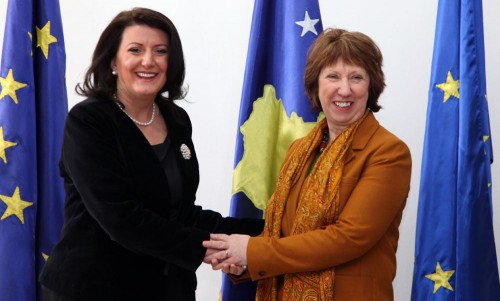 Recently, Kosovo’s President Atifete Jahjaga came under fire after she extended the mandate of the three foreign judges sitting in the country’s constitutional court. “This act of the President, erroneously reported as the extension of the Judges’ mandate by the her sole initiative, is just another newcomer in some kind of a trend of labeling acts of the public institutions of Kosovo as unconstitutional. The President of Kosovo might have made several mistakes in the past, but signing the decree to extend the mandate of international judges in the Constitutional Court, was not one of them”, argues Donikë Qerimi.
Recently, Kosovo’s President Atifete Jahjaga came under fire after she extended the mandate of the three foreign judges sitting in the country’s constitutional court. “This act of the President, erroneously reported as the extension of the Judges’ mandate by the her sole initiative, is just another newcomer in some kind of a trend of labeling acts of the public institutions of Kosovo as unconstitutional. The President of Kosovo might have made several mistakes in the past, but signing the decree to extend the mandate of international judges in the Constitutional Court, was not one of them”, argues Donikë Qerimi.
Read all the posts concerning the Kosovo Constitutional Court debate here.

Although often referred to as unilateral, Kosovo’s Declaration of Independence in 2008 was closely co-ordinated with its international partners, including the US and most of the EU member states, who vowed to supervise the new country in its footsteps of democracy. The Constitutional Court, established in 2009, was one of the most important institutions that needed to be independent and impartial, thus three of its nine judges were appointed by the international community, through an International Civilian Office (ICO) that operated between 2008 and 2013. With a Portuguese judge experienced in criminal law, prosecution and procedure, a Bulgarian judge who peaked her career serving for the European Court of Human Rights, and a refreshing perspective of US Constitutional Law that the third, American judge, brought, the Constitutional court was enriched with the vibrant professional expertise it needed. The Court’s important decisions, which included high profile cases such as the dismissal of two Presidents, were generally respected and praised, not only locally but also internationally.
With the closure of the ICO in 2012, however, the mandate of the international judges serving in the Court remained somehow hung. While Kosovo’s system proved fairly functional, the Assembly of Kosovo, the institution vested with the power to propose Constitutional Court judges to the President for appointment, found it extremely hard to choose new judges. Perhaps for this reason, or the further necessitated expertise, or possibly for other unknown reasons, it was considered essential that the international judges continue serving in the Court. With no ICO in the picture, Kosovars turned to the other international mission in their country – the EU rule of law mission EULEX – seeking a solution. However, EULEX’s mandate in Kosovo was coming to an end too. As both the Government and the EU agreed that their assistance in Kosovo was needed further, modalities to extend the mandate were being searched for.
Since not all EU member states recognize Kosovo’s independence (Cyprus, Greece, Romania, Slovakia and Spain haven’t recognised it yet) a classic agreement could not be signed between the EU and Kosovo. Hence, the idea of an exchange of lettersbetween the head of state and the representative of the EU, mirroring one another and showing a meeting of the minds, emerged. This procedure is governed by principles of international law and indeed fulfils the criteria of the Vienna Convention on the Law of Treaties. For the agreement to be applicable in Kosovo, a ratification by the Assembly was needed. Thus, this exchange of letters was ratified as an International Agreement by the Kosovo Assembly with 2/3 of the votes of all the MPs, in April 2012, when EULEX’s mandate was extended for the first time. The letters, however, remained short when it comes to delegating the power over the Constitutional Court judges to EULEX, as such a competence was not foreseen.
The competences over Constitutional Court judges were included only in the second exchange of letters, which was again ratified as an international agreement by the Assembly on April 23, 2014, when the mandate of EULEX was extended for the second time, and now runs until 2016. This second exchange of letters is paramount to the Constitutional Court’s functioning today, as well as the source of unclear criticism to the appointment procedures.
Following the national elections of June 8, 2014, Kosovo’s political scene has been confusing, to say the least. With spectacles of unexpected agreements of political parties and inconclusive constitutive sessions of the Assembly , the formation of the Government remains deadlocked. With one party having won the elections and the others having agreed to a post-election coalition, it was unclear who should be nominated by the President to form a government. The people’s eyes looked up to the President of the country, in the hope of a miraculous solution. Instead, the President dodged the bullet and referred the question to the Constitutional Court. Hence, attention shifted to the Court. Moreover, another high-profile case stood before the Court just a month later, when the question of the election of the new President of the Assembly was being considered. Besides issuing two highly controversial verdicts on the two said issues, the Constitutional Court was under the spotlight again on September 1, 2014 when the President of Kosovo “decreed the confirmation of the continuation of the mandate of the international Judges of the Constitutional Court”.
This act of the President, erroneously reported as the extension of the Judges’ mandate by the President’s sole initiative, is just another newcomer in some kind of a trend of labeling acts of the public institutions of Kosovo as unconstitutional. What exacerbated these assumptions even further was the recent resignation of the American Judge, Robert Carolan, who also happened to be the dissenting judge of the last controversial verdict of the Court. While Judge Robert Carolan might have had several reasons to leave the Court, the extension of his mandate should not have been one of them. Similarly, the President of Kosovo might have made several mistakes in the past, but signing the decree to extend the mandate of international judges in the Constitutional Court, was not one of them.
The critics, be it political parties or voices within the international community, seem to miss two important elements. Firstly, the President did not appoint or reappoint these judges on her own, independent, action. The President merely confirmed an appointment that was made beforehand by the EULEX. The unpublished letter of EULEX Kosovo’s Head of Mission, referred to in the President’s notice of decree contains the appointments of these three judges as Constitutional Court Judges in the same way as all other ones. According to the Exchange of Letters between the President and Catherine Ashton, an international agreement that was ratified by the Kosovo Parliament, the President delegated to EULEX many powers that would otherwise pertain to different Kosovo institutions. One of them is the judges’ appointment procedure that belongs to the President. Instead, according to the agreement, she maintains a power to merely “confirm” the appointment that EULEX makes. She is ought to receive a notification by the mission with the names and biographies of the judges subject to her confirmation. Hence, the question shifts to whether the EULEX indeed had the power to propose judges for the Constitutional Court. The answer is found again in the President’s letter and this is the second element that was missed by the critics.
The first exchange of letters, in 2012, only mentions the appointment of judges of the regular courts and is silent as to the Constitutional Court ones, perhaps simply because the latters were under the auspicies of the ICO, which still existed at the time. However, the exchange of letters of 2014 is tailored to address the Constitutional Court as well.
Firstly, the President confirms the current existing mandate of those judges, unlike the 2012 letters. Most importantly, among the powers that the President delegates with the exchange of letters, the first one is “to appoint judges under article 65 [of the Constitution]”. Article 65 speaks of the Assembly’s powers, including the power to “(11) propose[s] the judges for the Constitutional Court”, later on subject to the appointment by the President. Therefore, the Assembly itself, by ratifying this exchange of letters between the President and Lady Ashton, has deliberately delegated its own power to propose these judges, to EULEX. This makes the dwelling into the initial mandate of these judges, coming from ICO and onwards, unnecessary and plainly legally irrelevant. Whether the same judges were proposed again and appointed again by EULEX, or whether they chose new names, EULEX has both powers to do so. They will soon put this second power into practice, with having to appoint a new judge to replace the vacant seat of Judge Robert Carolan. In the meantime, the President once again will simply confirm EULEX’s choices. It has been opined locally in Kosovo that this was some form of amendment of our Constitution. Like other accusations in this regard, this does not stand either. That is because Kosovo’s Constitution, unlike many, in its Article 20 contains a provision that allows the state, via International Agreements, to delegate its sovereignty by “delegate[ing] state powers for specific matters to international organizations”. It could be well said that situations like these were the exact reason why such a peculiar provision was inserted in the Constitution in the first place.
The whole setting makes Kosovo’s constitutional order quite complex and the documents that constitute this order are often perplexing. Yet, on this particular matter, the order is clear, at least to anybody who understands law.
Note: This article gives the views of the author, and not the position of LSEE Research on SEE, nor of the London School of Economics.
___________________________
Donikë Qerimi is a jurist & PhD Candidate in Private International Law. She is a former legal advisor to the Government of Kosovo, and former Project Officer of a project that led to the establishment of the Constitutional Court. She tweets @DonikeQ




Dear Author!
I understand your arguments after 2012, that EULEX has the right to appoint int. judges in Kosovo, even for the Constitutional Court since it is written in the second exchange of letters, on the 8th page (in the referred document.
My question is the following: The constitution of Kosovo doesn’t mention that any international authority should delegate international judges to the Court. The constitution came into force in 2008, the Constitutional Court was established in 2009. The exchange of letters happened in 2012 and 2014. Between 2009 and 2012, what was the legal basis of the international judges’ presence in the Constitutional Court?
Thank you in advance.
László
Dear László,
My blog briefly touched upon this period, given that it was not a contested point. There were several Constitutional Articles that were in force between 2008 and 2012 that spoke of Kosovo’s supervised independence. The institution that was vested with the power of this supervision was the International Civilian Office (ICO) which also had the power to appoint the international judges of the Constitutional Court. With the end of supervision of independence, these articles were removed. Hence, the ICO ceased to exist and the need to make another arrangement (included in the Exchange of letters) became apparent. You can find the old version of the Constitution as well as the Amendments here: https://gzk.rks-gov.net/ActsByCategoryInst.aspx?Index=1&InstID=1&CatID=1
The Amendment in question is the 2012 one.
Also, check out the law that was adopted to sort out the remaining issues related to the end of supervised independence, adopted the same day: http://www.kuvendikosoves.org/common/docs/ligjet/Law%2004-L-115.pdf
I hope this was helpful!
Dear Donikë Qerimi!
Thank you for the quick answer. Really helpful, thank you.
Best regards,
László